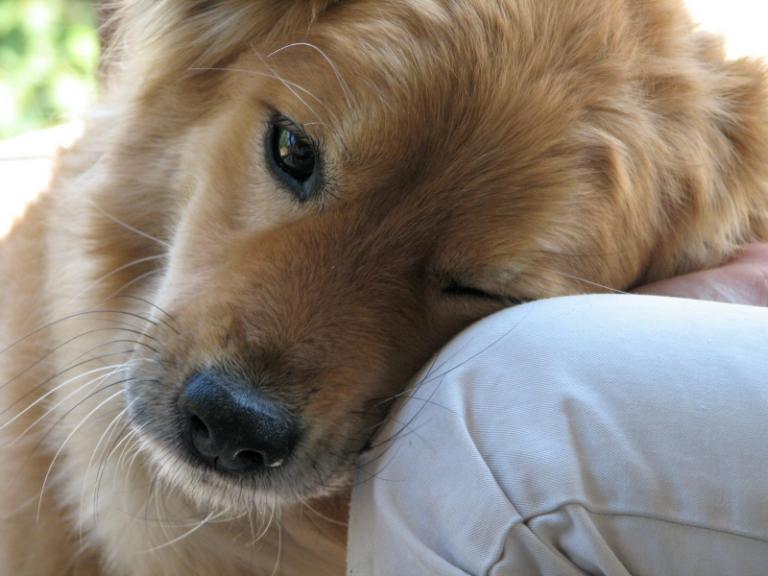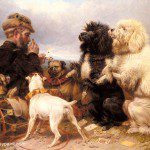Yesterday I was writing about Dave Burchett, whose book Stay reflects on the ways his dogs have helped him grow as a disciple of Jesus. Another lesson that his dogs taught Burchett was to live in the moment. When his dog Hannah came down with her own cancer, had surgery, and returned with a twelve-inch scar and prescription for chemotherapy, Burchett was reeling. He feared losing his beloved pet, his canine tutor. But then his veterinarian changed his perspective with these words: “Hannah does not know that she is sick. Dogs have no fear of death, so they live in the moment. Enjoy each moment that you have [with her].”
In the days ahead Burchett realized that his dog was teaching him the meaning of Jesus’ words, “Don’t worry about tomorrow, for tomorrow will have worries of its own” (Mt 6:34) She was also helping him understand what C.S. Lewis meant when he asked, “Where, except in the present, can the Eternal be met?” We tend to live in the past and the future, finding it difficult to savor the present. Bad memories or fears for the future rob us of present joy. Dogs don’t have that problem. As Burchett puts it, they love life. They are on vacation every time you let them out the door.
Dogs also illustrate absolute trust. For them, we (their master/owner) are the center of their universe. We are the focus of their love and faith and trust. They serve us for scraps of food, and the same boring food day after day. But they are thrilled to get it every time. When we ask them to go with us, on a walk or in the car, they don’t ask us where we are going. We don’t have to beg or cajole. They jump with joy, trusting it will be fun. There could hardly be a better model of what it means to trust and follow our Lord Jesus.
Dogs welcome their masters like few if any other animals. They jump up and wag their tail, rushing to our side when we walk in the door. They don’t care a lick (Burchett’s intended pun) about our wealth or looks or status. They are God’s canine self-esteem boosters—not only when we get home but any time we talk to them. As humorist Dave Barry puts it, your dog thinks you’re a genius. “You can say any fool thing to a dog, and the dog will give you this look that says, ‘ . . . You’re RIGHT! I NEVER would have thought of that!”
What a picture of the way we ought to welcome and respect our loved ones, or our fellow members of the Body of Christ! Burchett imagines how he should welcome his wife based on what he has learned from his dog.
I [should] drop what I am doing to greet Joni, genuinely excited to see her.
I show her physical affection without any ulterior motive.
I am completely interested in her.
I accept her mood, whatever it might be, without judgment.
I listen to her frustrations without demanding to know how she could feel that way or offering countless “solutions.”
If she needs to talk, I am wholly present.
If she cannot meet my needs, I am not angry or withdrawn.
Of course Scripture does not tell us to welcome others as your dog has welcomed you. Instead it tells us to “welcome one another as Christ has welcomed you” (Rom 15:7). But God teaches us through his creation all sorts of things about life in his kingdom. And dogs are among his many creatures that teach us how to be, in this case, welcoming to our brothers and sisters in the Body. They illustrate types of the welcoming character of Jesus.
That includes, perhaps most poignantly, forgiveness. Burchett suggests we take a little quiz to see who is most willing to forgive. Lock your spouse or significant other and your dog outside in the rain for thirty minutes. When you finally open the door, which one is glad to see you?
Burchett said he could do all sorts of unkind things to his dog and nothing would cause her to be unforgiving. He could ignore her or snap at her or refuse her nuzzles. But then when he called her name, she would still run to him with the abandon of love. She would never betray the least hint of unforgiveness or condemnation. I remember accidentally forgetting our dog Jaffa for most of a day. She was left inside our house without food or chance to run outside. But when I came home, she rushed to me with her doggy-smile, jumping up and down with joyous excitement. Not a trace of anger or resentment. She, like most dogs, was a model of forgiveness.












